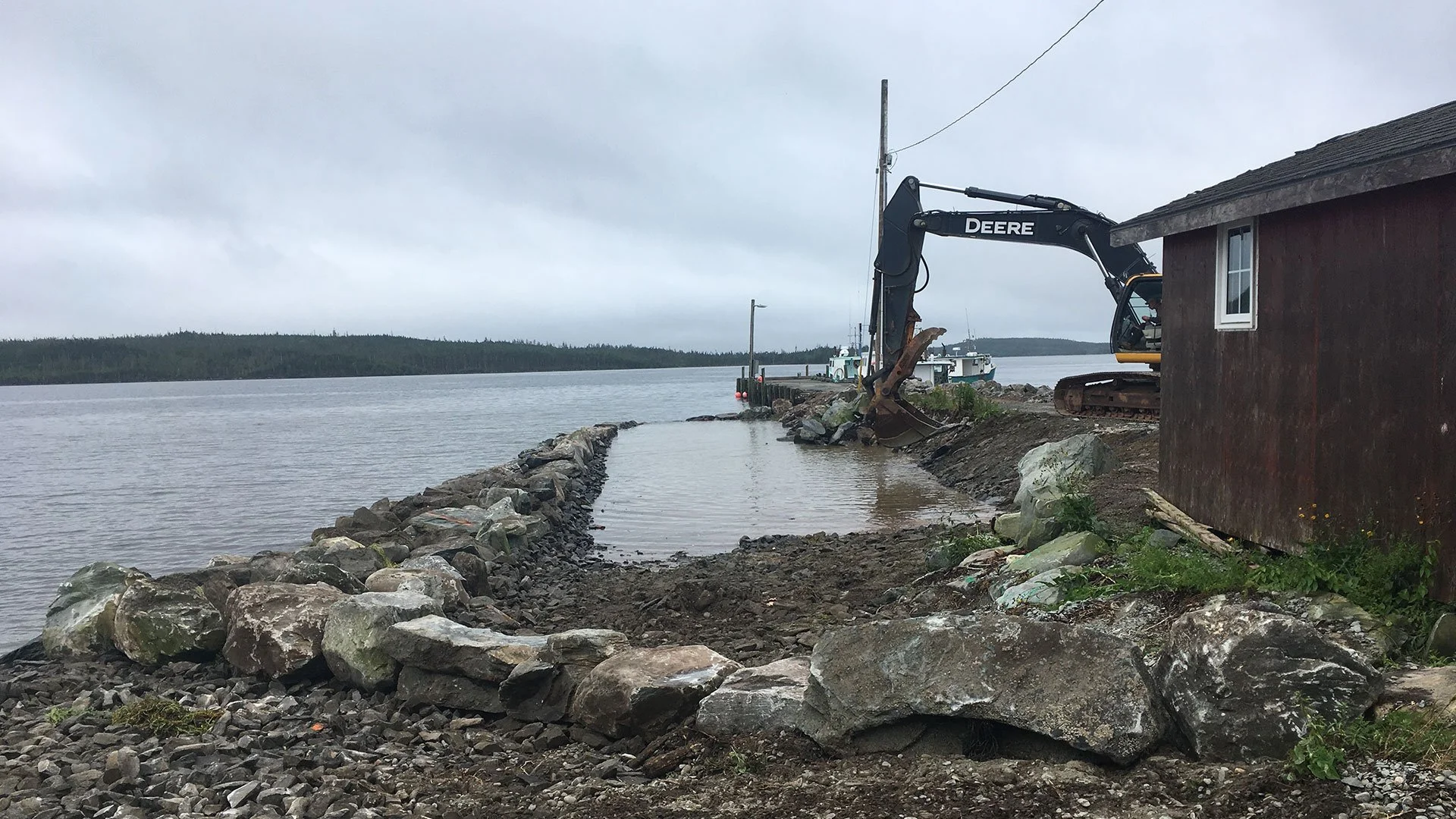Little Liscomb Wharf Reconstruction
Location: Little Liscomb, Nova Scotia
Client: Department of Fisheries and Oceans, Small Craft Harbours
Timeframe: 2018-2020
Key Staff: Mark Reynolds, Stephen O’Brien, Jason Long
Project Description
The Little Liscomb wharf was an existing creosote timber crib which was partially demolished and encapsulated in a new Berlin Wall structure. The new structure was raised in elevation, and the deck was made 30% wider to allow for additional trap storage and parking for vehicles and equipment. At the offshore end, the deck was tapered to match into an adjacent crib structure.
Harbourside’s Role
For this project, Harbourside was engaged as the prime consultant to complete the planning, design, and contract administration for the encapsulation of one section of timber crib wharf. Work was broken down into four phases including: the preliminary design phase; the detailed design phase, the tender phase and the construction and project closeout phase. Below, we have highlighted the key tasks performed in each phase of the project.
Preliminary Engineering Design Phase
In the preliminary engineering design phase, the keys tasks included an existing facility assessment and a preliminary options analysis report with capital cost estimates. Multiple options were considered from the preliminary engineering designs, based on the assessment’s findings. Ultimately, a Berlin Wall was determined to be the optimal choice.
Detailed Engineering Design Phase
After selecting the preferred option, the detailed design phase included client and public consultations, detailed design of the Berlin Wall and development of the specifications and a capital cost estimate. During this phase, design review meetings were completed at 33%, 66% 99% and finalized tender documents. These design review meetings included the review of the engineering drawings package, project specifications, capital cost estimates, the project schedule, and a review of the risks to the project.
Tendering and Construction
After the construction documents had been developed, Harbourside provided support during the tender phase by answering technical queries, providing additional information to bidders, and preparing addendums. During construction, Harbourside had onsite personnel there to oversee construction including completing inspections, quantity calculations and concrete testing. In addition, Harbourside reviewed progress claims, change orders, shop drawings, answered technical queries and completed additional commissioning and post construction tasks to close out the contract. This project was completed in the spring of 2020.
Environmental Permitting
As part of this project, Harbourside was involved in supporting DFO SCH with their environmental submissions to obtain the environmental permits. Harbourside also supported DFO SCH with their submissions to Transport Canada to obtain approval to complete the construction of this structure. During construction, Harbourside oversaw the onsite construction work to ensure compliance with the applicable permits. This was important due to a highly sensitive area adjacent to the site. This site, rich in eel grass, is an ecologically important plant that required proper handling. The importance of eel grass is explained by the CBC in a 2022 article.
Unique Challenges
One of the main project challenges was encapsulating part of the existing wharf with a taller and wider structure. Another major challenge was dealing with environmental concerns around the nearby eel grass. The first was dealing with the disposal of the existing creosote timbers, which could leech toxins into the local environment. Secondly, dredging of contaminate spoils was required to facilitate construction of the new wall. To control project costs while working within the environmental constraints of the projects, we recommended minimizing demolition of the existing creosote timber crib and recommended the construction of an onsite containment cell to contain the dredge spoils. These challenges as well as completing construction between fishing seasons is commonly encountered with DFO SCH work.
Social Impact
As with small craft harbours across Nova Scotian and Atlantic Canada, the Little Liscomb wharf plays a vital role in its community. Completing this rehabilitation project between fishing seasons was critical in order to ensure that people’s livelihoods were impacted as little as possible. With the repairs to the partially demolished wharf, people who rely on their small craft vessels to make a living can do so in a higher degree of safety. The additional precautions taken to mitigate creosote contamination, will also go a long way to help maintain the health of the local water ecology. This goes double for the mitigation efforts undertaken to help prevent damage to the local eel grass.






